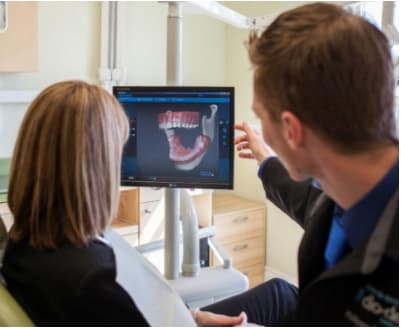Philippe Dionne is a denturist at Hawkesbury Dental Centre. He creates and places dentures, and makes adjustments and repairs if required.
Understanding Edentulism: Options for Those With Missing Teeth
Living with edentulism, or missing teeth, can result in various challenges. These include difficulties in mastication, which refers to the process of chewing and grinding food using the teeth, as well as changes in physical appearance, such as the appearance of the smile or alterations in facial features. Additionally, elocution issues, which refer to difficulties in speech and pronunciation, may arise.
If you are currently facing any of these concerns, dentures could be a suitable solution. Dentures are custom-made in collaboration with both a dentist and a denturist. At Hawkesbury Dental Centre, we provide this comprehensive service. Philippe Dionne D.D., who operates independently at his clinic within Hawkesbury Dental Centre, ensures that you benefit from the expertise of both dentists and denturists, all under one roof. Our dedicated team looks forward to meeting and serving you.


Learn More About Dentures and the Different Types
Dentures can be full or partial, replacing missing teeth and preventing the natural migration of adjacent teeth towards the space created by the latter. Their intent is to restore the masticatory function, phonetic function, or the appearance of your dentition.
Full Dentures
Referred to as false teeth or complete dentures, full dentures are often recommended if you are missing an entire jaw of teeth. Full dentures can be fitted to your upper or lower gums. Suction or oral adhesive can be used to hold them in place. You'll be able to remove this set of dentures to clean them, and overnight when you sleep.
Partial Dentures
If you are missing more than a few teeth, or if the teeth surrounding the gap are not strong enough to support a dental bridge, our denturist will likely recommend partial dentures. These are made of one or more artificial teeth, which are held in place by clasps that are attached to your natural teeth, or a tooth replacement such as a dental crown. Partial dentures can be removed so you can clean them, and while you sleep.
Implant-Supported Dentures
If our denturist finds that you do not have sufficient gum tissue to support full dentures, he may recommend dental implants to help stabilize your dentures and secure your replacement teeth.
The Treatment for Placing Dentures is Based on a Three-Step Process.
1. The patient meets their dentist for a dental examination. The dentist will evaluate whether dentures should be created in addition to dental implants. Please note that at the Hawkesbury Dental Centre, you can choose an intervention under sedation for procedures like dental implants. The sedation service can be offered to those who experience a high level of anxiety during dental procedures. This practice in our centre allows the patient to be completely unconscious or semi-conscious, according to their comfort level. As a result, the patient can benefit from treatment in comfortable conditions.
2. The dentist begins by taking dental impressions. They then transmit this information to the denturist, who will use it to create custom-made dentures.
3. The dentist or denturist places the dentures. In the case of an adjustment or repair, the dentist or denturist will first attempt to identify the anomaly. If the dentist undertakes this task, they will transmit the information to the denturist, who will proceed with the adjustments. Subsequently, the dentures will be replaced.
The information provided is general information that may not apply to each patient's unique case.

